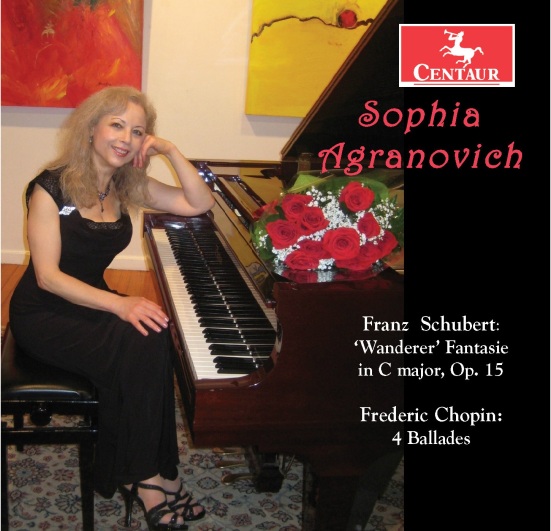
Schubert: “Wanderer” Fantasie in C. Chopin: Ballades (4) / Sophia Agranovich, pianist / Centaur CRC-3427
A disclaimer before I begin this review: I have been in touch with Sophia Agranovich via e-mail, in fact I previously interviewed her for a classical journal, and she knows how much I love and respect her. Despite her enormous talent she hasn’t really had it easy in life, and in fact after her studies at Juilliard with Sasha Gorodnitzki and Nadia Reisenberg (who she has described to me as “a warm presence”), she had to give up her burgeoning career for several years in order to go to work in the private sector and make money to raise her family. This tells you everything you need to know about her: she is a woman of firm resolve and determination, self-sufficient and strong. How could you not admire her?
And happily, her artistry at the keyboard is equally admirable. I often tend to flinch from Romantic works, particularly those of Chopin whose music seems to bring out the softest, goopiest, most touchy-feely aspects in many performers. But not Agranovich. Like such Eastern European pianists as Lipatti, Fischer, Cziffra and, yes, Reisenberg, her Chopin is more muscular and less soft-grained than we are normally used to. (The only Western European pianist whose Chopin is equally wide-awake was Alfred Cortot, whose 1929 recordings of the Ballades compare favorably to Agranovich’s.) This is particularly evident in the transition passages, i.e., those bars of music that take you from one part of the theme to another. These are exactly the moments where too many other pianists relax the tension a bit, making the music flow like a ripple on a stream. In Agranovich’s skilled hands, these passages emerge as sturdy pieces of the overall structure, necessary transitions that bind the music together rather than simply rolling along. Such an approach makes all the difference in the world between glorified mood music and music that engages the mind as well as the emotions.
But by and large, Chopin—and Schubert—tend to be misrepresented, and I think it comes from our modern re-defining of the word “Romantic.” The real Romantic movement was based on the emotional outpourings of Goethe and Beethoven. Neither artist’s works are much given to touchy-feely interpretation with the possible exception of the first movement of the latter’s “Moonlight” Sonata. Deep feelings were part of the original Romantic movement, but also love that could cross the boundary to obsession (think of Goethe’s Sorrows of Young Werther or Schubert’s Die Winterreise), or—better yet—a love so deep and so strong that one could kill to protect one’s beloved (Beethoven’s Fidelio). These works still resonate with us because of the touch of tragedy that permeate them.
Such a work is Schubert’s “Wanderer” Fantasie, in my view his single greatest piano work.
Perhaps I should point out that Schubert, like many composers who were not virtuosi themselves (Sorabji is another example), often wrote piano music that was more difficult than they themselves could play, and the “Wanderer” Fantasie was one such. Schubert said of it, “The devil may play it, for I cannot!” but that didn’t stop him from putting it down on paper. Its structure is in four movements, but the movements are played in an unbroken sequence and, to the untrained ear, it sounds like a big 20-minute movement with differing episodes. You really need to be mindful of those episodes because of the complete shift in mood, and Arganovich keeps her mental eye on the ball here. My other favorite performance of this work is the old Vox recording by young Alfred Brendel, whose performance was, if anything, even less Romantic in feeling and more structural than hers, but this version holds your interest because of the greater detail brought out in the music. It makes perfect sense to me that it was written in November 1822 while Schubert took a break from writing his “Unfinished” Symphony—the music is of the same style, tragic in mood while employing strong counterpoint and inner voices to bring the feeling out. The pianist who approaches this work needs be mindful of this underlying structure, as it is imperative that everything be clear and all strands held together. Agranovich does this magnificently in addition to imparting more warmth to the work than young Brendel did.
This, then, is a disc of high intrinsic worth as well as another feather in the cap of this superb pianist. I highly recommend it.
